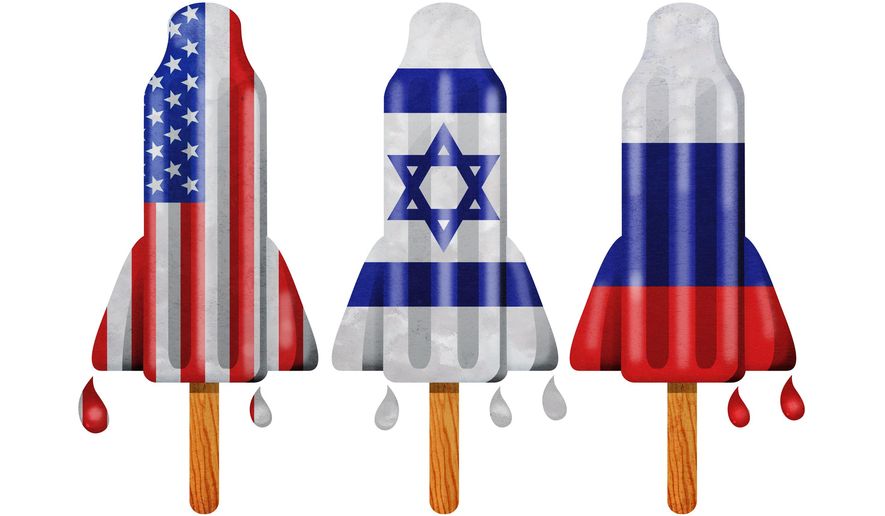OPINION:
Although the Soviet Union has disappeared, a new Cold War is rapidly emerging between the United States and Russia. For Israel, a tiny country seeking to endure amid expanding regional chaos, this revival of superpower rivalry could signal either greater risks of national insecurity or a better opportunity for national survival. In part, at least, the outcome could be determined in Jerusalem, not only in Washington or Moscow.
In essence, several sorts of purposeful realignment are now possible for Israel. To begin, both Washington and Moscow are sure to notice that Israel represents a uniquely reliable oasis of stability in an otherwise disintegrating region. Over time, this recognizable awareness could permit Jerusalem to deal selectively with both superpowers, on a security-enhancing basis.
The intellectual foundations of any expedient Israeli reactions to Cold War II must lie in the Jewish state’s own inclinations to look where it has never looked before. This means displaying a prior willingness to explore the changing and increasingly complex dynamics of U.S.-Russia relations in the Middle East.
At its core, what is being suggested here is a novel willingness in Jerusalem to explore a daunting but appropriate “strategic dialectic,” a thoughtful framework of understanding that would be based upon progressively complex intersections of questions and answers. Historically, dialectic began long ago, in ancient Greece, but it now also represents the best way for modern Israel to identify and determine its most vital security options.
Israel must ask itself the following basic question: What will be the true form and underlying meaning of Cold War II, and how should this still-emerging geometry of competition affect its own national survival strategy, including its still-implicit nuclear strategy? The “correct” answers will have to come, at least in part, from certain antecedent efforts at fashioning a much deeper understanding of transforming U.S. and Russian geopolitical interests. Here, special attention will need to be directed toward any apparent changes in either or both superpower’s nuclear weapons and strategy. In other words, going forward, Jerusalem must bear in mind that certain changes in U.S. or Russian nuclear strategy could more or less substantially impact critical power distributions and configurations in the Middle East.
In summary, Israel’s principal strategic emphases will still need to be placed upon assorted national preparations for deterrence, preemption, defense and war-fighting functions. Among other things, this must mean certain steady refinements of ballistic missile defense, and also various recognizable movements away from the country’s traditional posture of deliberate nuclear ambiguity, that is, the increasingly problematic “bomb in the basement.” Expressly urgent, in this particular regard, will be the now-obvious failure of diplomatic efforts to curb Iran’s nuclear weapons program. The July Vienna agreement on Iran will have no meaningful impact upon the Islamic republic’s plainly irreversible commitment to producing nuclear weapons. As the 17th-century English philosopher, Thomas Hobbes, had already correctly observed in his “Leviathan”: “Covenants without the sword, are but words.”
This misconceived agreement also managed to subvert two already-existing international treaties, the Nonproliferation Treaty of 1968, and the Genocide Convention of 1948. Significantly, these treaties are ipso facto the law of the United States, by virtue of the Constitution’s expressed “Supremacy Clause” (Article 6), and also of various U.S. Supreme Court decisions, especially the Paquete Habana (1900).
For Israel, the rekindling of Cold War tensions between Washington and Moscow presents a serious but also an opportunistic challenge. Should this challenge be suitably interpreted in Jerusalem, the Jewish state’s indispensable strategies of national survival will stand a much better chance of long-term success. It is, therefore, still entirely possible that certain Cold War II consequences could unfold to Israel’s overall strategic advantage, rather than to the advantage of its myriad and often overlapping enemies.
Even here, however, it will first be necessary for Jerusalem to plan ahead, and to more fully examine all pertinent dynamics of Cold War II. A proper starting point would be the growing commonality of interest between Washington and Moscow in combating jihadi terrorism. More than any other country on earth, Israel is positioned to advise one or both of the superpowers on expected requirements of success in what is a conspicuously joint struggle. In its expected unfolding, Cold War II could eventually prove to be a distinct asset rather than injurious liability for Israel’s core national security.
• Louis Rene Beres is emeritus professor of international law at Purdue University.




Please read our comment policy before commenting.